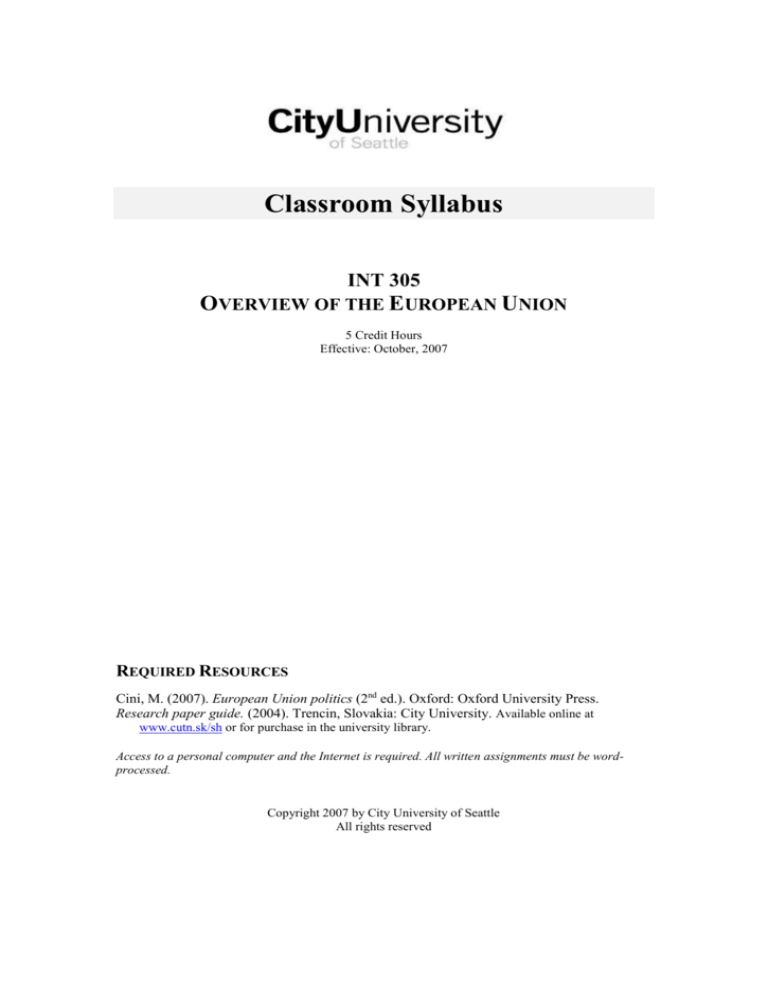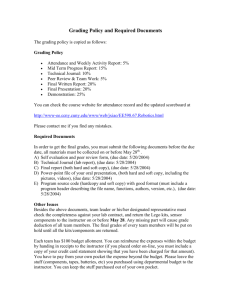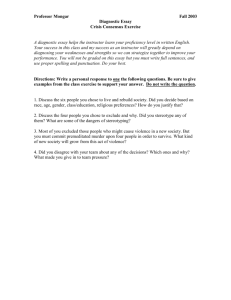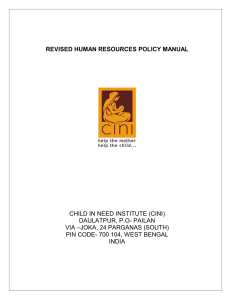
Classroom Syllabus
INT 305
OVERVIEW OF THE EUROPEAN UNION
5 Credit Hours
Effective: October, 2007
REQUIRED RESOURCES
Cini, M. (2007). European Union politics (2nd ed.). Oxford: Oxford University Press.
Research paper guide. (2004). Trencin, Slovakia: City University. Available online at
www.cutn.sk/sh or for purchase in the university library.
Access to a personal computer and the Internet is required. All written assignments must be wordprocessed.
Copyright 2007 by City University of Seattle
All rights reserved
INT 305
OVERVIEW OF THE EUROPEAN UNION
COURSE DESCRIPTION
This course is a study of the social, economic, political/legal and technological issues
surrounding European integration and their impact on strategic management of business. The
course also focuses on the changes in Central and Eastern Europe and examines the Single
European Market in a global context.
SCHOLASTIC HONESTY POLICY
City University of Seattle expects each student to do his/her own work. The University has
"zero tolerance" for cheating, plagiarism, unauthorized collaboration on assignments and
papers, using "notes" during exams, submitting someone else's work as one's own, submitting
work previously submitted for another course, or facilitating acts of academic dishonesty by
others. The penalties are severe! A first offense can result in a zero grade for the assignment
or for the course; a second offense can result in a zero grade for the course and suspension for
one or more quarters; a third offense can result in expulsion from the University. The Policy
and Procedures may be found at www.cutn.sk/SH
In addition to providing your work to the instructor for grading, you must also submit an
electronic copy for the City University of Seattle archives (unless the work is specifically
exempted by the instructor). You will not receive a grade for particular work until and unless
you submit this electronic copy. The procedure for submitting work to the archives is to
upload it via the website www.cutn.sk/Upload. Files should include the cover page of the
work with the student name, instructor name, course name and number, and date. File names
should indicate the type of assignment, such as “researchpaper.doc”, “casestudy.doc” or
“thesis.doc” (student name should not be a part of the file name because the system adds it).
All files received into the archives are submitted to www.TurnItIn.com for plagiarism
checking.
LEARNING GOALS
Upon the successful completion of this course, you will be able to:
1. Recognize the dominant political, social and cultural features of the European Union and
its institutions;
2. Recognize the history and evolution of the European Union;
3. Describe the different roles and relationships of government and business in the countries
of the European Union;
4. Identify social issues and their stakeholders within the countries of the EU;
5. Evaluate approaches to strategic management of business within the context of a unified
Europe;
6. Integrate concepts of cross-cultural management with strategy formulation and
implementation;
7. Assess the importance of European citizenship and the dialogue between peoples and
cultures;
8. Differentiate the legal, ethical and social responsibilities placed upon business in the
Member States of the European Union;
INT 305 Classroom SYL Page 2
Eff: 10/07
9. Describe the strategies for sustainable development and the environment within a
European context;
10. Describe the enlargement process of the European Union and to assess future
developments of the European Union;
11. Assess the global impact of the Single European Market;
12. Evaluate the position of the European Union in a global context.
CORE CONCEPTS
To achieve the goals of this course, you will need to master the following core concepts:
1.
Evolution of the EU;
2.
The European Union & Member States;
3.
European Institutions;
4.
European Budget;
5.
European Law;
6.
Schengen Agreement;
7.
European Economic Policy;
8.
The Single Market;
9.
Common Agriculture Policy;
10. Agenda 2000;
11. European Regional Policy;
12. European Funds;
13. European Social Policy;
14. European Environment Policy;
15. European Cultural Policy;
16. European Enlargement Policy;
17. European Treaties;
18. European Constitution;
19. Common Foreign and Security Policy;
20. EU and World Trade;
21. The Future of the EU.
RECOMMENDED SUPPLEMENTARY RESOURCES
As a City University of Seattle student, you have access to library resources regardless of
where you are taking this class. To access the resources that are necessary to complete your
coursework and assignments, visit the library menu in the My.CityU portal at
http://my.cityu.edu.
Search the online databases for journal, magazine, and newspaper articles. Articles that are
not available full text in the library's collection can be requested from other libraries and
delivered to you electronically. For additional help, submit your question via the Ask a
Librarian e-mail service available through the portal.
INT 305 Classroom SYL Page 3
Eff: 10/07
ELECTRONIC RESOURCES
The following Internet resources may be of use to you in this course. Please be aware that
Web addresses may change from time to time. Consult your instructor if you have questions
about electronic resources.
European Union Server:
http://europa.eu.int/index-en.htm
European Union Server advanced search:
http://europa.eu/geninfo/query/advSearch_en.jsp
European Union Delegation of the European Commission to the USA
http://www.eurunion.org
Eurobarometer: Surveys on Opinions and Attitudes of Europeans
http://europa.eu.int/en/comm/dg10/infcom/epo/eb.html
What's new on EUROPA?
http://www.europa.eu.int/geninfo/whatsnew.htm
The European Commission
http://europa.eu.int/comm/index_en.htm
European Investment Bank
http://www.eib.eu.int
European Central Bank - European monetary Institute
http://www.ecb.int
The European Union Constitution and Treaties
http://www.unizar.es/euroconstitucion/Home.htm
Interactive Guides to the EU and EU Presidencies
http://www.webershandwick-eu.com/newsroom/index.html
Office for Harmonization in the Internal Market
http://oami.eu.int/en/default.htm
The following online EU journals also contain useful articles:
EP News (European Parliament news), monthly, from 1996- present
http://www.europarl.eu.int/news/public/default_en.htm
EU Publications Office
http://publications.eu.int/index_en.html
European Voice
http://www.european-voice.com/
INT 305 Classroom SYL Page 4
Eff: 10/07
PRINT RESOURCES
El-Agraa, A. M. (Ed.). (2004). The European Union: Economics and policies (7th ed.).
Harlow: Prentice Hall.
McCormick, J. (2005). Understanding the European Union: A concise introduction (2nd ed.).
New York: Palgrave Macmillan.
Sergi, B. S. & Bagatelas, W. T. (Eds.). (2004). The Slovak economy and EU membership.
Bratislava: IURA Edition.
INT 305 Classroom SYL Page 5
Eff: 10/07
OVERVIEW OF COURSE ACTIVITIES AND GRADING
The grade you receive for the course will be derived using City University of Seattle’s
decimal grading system, based on the following:
Assignments
Oral Presentation(s)
Essay
Research Paper
3 Quizzes (equally weighted) or Midterm
Final Examination (comprehensive)
20%
15%
25%
15%
25%
TOTAL
100%
Please see the current City University of Seattle catalog or consult your instructor for
guidance in determining your decimal grade.
EXPLANATION OF ASSIGNMENTS AND GRADING
ORAL PRESENTATIONS
Students will prepare presentations to complement topics of the lectures and/or to present
current EU events. Your instructor will demonstrate the type of presentation and provide a
choice of topics during the first week of the course. Presentations will be given throughout the
term according to a schedule provided by your instructor.
Grading Criteria for Presentations
Verbal communication skills (voice, volume, pace)
Non-verbal cues (body language, eye contact, appearance)
Language (appropriate vocabulary, pronunciation, grammar)
Organization (timing, well-constructed introduction/conclusion)
Content (logic, documentation, analysis, synthesis, adaptation to
audience)
Visual aids (appropriateness and effectiveness)
10%
10%
10%
10%
50%
TOTAL
100%
10%
ESSAY
You will prepare an argumentative essay about a topic from the course. Your instructor will
provide you with a list of possible topics and further direction. The essay should be no longer
than four pages, following the format and reference methods guidelines found in the City
University Research Paper Guide.
Grading Criteria for Essay
Clear objectives and thesis
Development of argument
Depth, appropriateness, and use of research
Proper grammar, spelling, syntax, and punctuation
Appropriate format and reference methods
10%
50%
10%
15%
15%
TOTAL
100%
INT 305 Classroom SYL Page 6
Eff: 10/07
RESEARCH PAPER
In your research paper, you will explore in depth a subject from the course material that
interests you. You should combine your own thoughtful analysis of the topic with
information from your sources. Keep in mind, however, that this is to be an analytical paper,
not simply a summary of your reading.
Begin doing some preliminary reading for your paper early in the quarter. During the fifth
week of the course, you will submit to your instructor a one- to two-page proposal for your
research paper. The proposal should suggest your topic, propose an arguable thesis, and give
your instructor some idea of how you intend to research and develop your thesis. This
proposal is not graded, but you should approach it seriously; it can greatly enhance your
chances for writing a successful essay.
For guidance in how to prepare a research paper, consult City University’s Research Paper
Guide. As you prepare your research paper you also will want to be mindful of the following
guidelines:
Your topic must be related to the course of study and must be approved by your
instructor.
You must cite the sources of all ideas, facts, and information used that are not your own,
even if you have put the information into your own words. Failure to do so is plagiarism,
even if the oversight is unintentional. See City University’s Research Paper Guide for a
detailed explanation of proper APA author-page documentation format.
Supporting your thesis is central to the task of writing a research paper. In scholarly
writing, you are not merely copying information from another author, but using evidence
to support the contentions drawn from your findings and critical analysis of related
literature.
All research papers must be word-processed and double-spaced. Your instructor will
specify other requirements such as length, number and type of sources, and how current
the publications from which you draw your references must be.
Grading Criteria for Research Paper
Clear objectives and thesis
Logical development of body and thesis
Depth, appropriateness, and use of research
Proper grammar, spelling, syntax, and punctuation
Appropriate format and reference methods
10%
50%
10%
15%
15%
TOTAL
100%
INT 305 Classroom SYL Page 7
Eff: 10/07
EXAMINATIONS
You should be prepared to answer a variety of types of questions pertinent to the concepts
covered in or suggested by the course materials. Your instructor may elect to have three
regular quizzes in place of a midterm exam. You will be provided with additional information
about the content and style of examinations in this course.
Grading Criteria for Essay Questions on Examinations
Clear grasp of major issues posed by the question
Valid arguments; appropriate supportive detail
Appropriate analysis, evaluation, and synthesis
Demonstrated ability to employ terms, concepts, and frames of
reference from texts, lectures, and other course materials
Proper organization and logical flow of responses
20%
20%
20%
20%
TOTAL
100%
INT 305 Classroom SYL Page 8
Eff: 10/07
20%
RECOMMENDED COURSE SCHEDULE
The schedule for course activities and assignments is below. If you find you are unable to
complete the assignments as scheduled, contact your instructor. Your instructor may elect to
adjust the outline to meet the unique needs of the class.
SESSION TOPICS AND ASSIGNMENTS
READINGS
1
Introduction and Overview
Evolution of the European Union (EU)
Cini, Chs 1, 2, 3
The Institutions of the EU
The European Parliament
The Council of the European Union
Cini, Chs 10, 11
2
Cini, Chs 9, 22
3
The Institutions of the EU
The European Commission
Other European Institutions
The EU and its Citizens
Democracy and the European Polity
DUE: Quiz #1
Cini, Chs 16, 20
4
EU Economic Policy
The Single Market
Economic and Monetary Union
DUE: Essay
The Common Agricultural Policy
DUE: Proposal for Research Paper
Midterm
Cini, Ch 21
5
6
EU Regional Policy
DUE: Quiz #2
Cini, Ch 18
7
Culture and Ethics
EU Environmental Policy
Handouts
EU Enlargement
The Future of the EU
DUE: Research Paper
Cini, Chs 4, 26, 27
8
Cini, Chs 14-15
9
The EU and the World
European Union External Relations
The EU’s Foreign, Security, and Defense Policies
DUE: Quiz #3
10
Review
Final Examination
INT 305 Classroom SYL Page 9
Eff: 10/07








